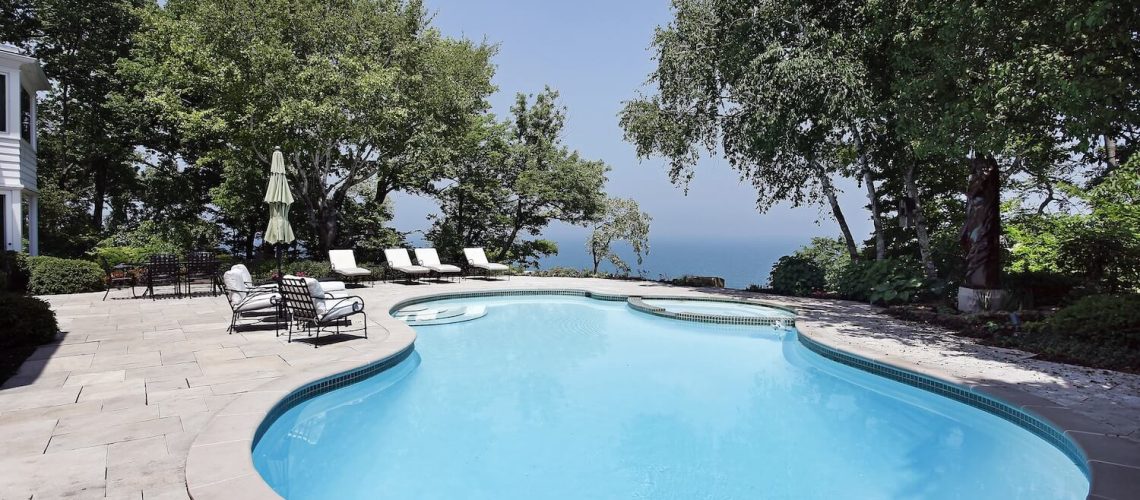Swimming pools are often the centerpiece of backyard entertainment, providing a place for relaxation, exercise, and social gatherings. While the pool itself is crucial, the area surrounding it, known as the pool deck, plays a vital role in the overall aesthetic and functionality of the space. One of the most popular choices for pool decking is pavers.
In this article, we’ll explore the practical benefits of pool paver installations that go beyond mere aesthetics.
1. Paver Durability and Longevity
Pool pavers are known for their durability and ability to withstand various environmental conditions. Made from materials like concrete, brick, stone, or porcelain, pavers are designed to resist wear and tear from foot traffic, pool chemicals, and weather elements. Unlike poured concrete or wooden decks, pavers do not crack easily under pressure or temperature fluctuations. This longevity means less frequent replacements or repairs, making pavers a cost-effective choice in the long run.
2. Slip-Resistant Surface Advantages
Safety around the pool area is paramount, especially in preventing slips and falls. Pool pavers offer a slip-resistant surface, which is crucial for wet areas. The texture and material of pavers provide better traction compared to smoother surfaces like tiles or polished concrete. This feature is particularly beneficial for families with children or elderly members, enhancing the safety of the pool environment.
3. Easy Pool Maintenance
Maintaining a pool area can be time-consuming, but pavers make this task easier. Pavers are low-maintenance and require minimal upkeep to keep them looking good. Regular sweeping and occasional washing with water and mild soap are usually sufficient to maintain their appearance. In case of stains, individual pavers can be replaced without disturbing the rest of the installation, unlike monolithic surfaces like concrete, where stains can be more challenging to remove.
4. Practical Heat Resistance
During hot summer days, pool deck surfaces can become uncomfortably hot. Pool pavers, especially those made from materials like travertine, limestone, or concrete, have excellent heat-reflective properties. They absorb less heat than materials like asphalt or dark tiles, staying cooler underfoot. This feature enhances comfort, allowing pool users to walk barefoot without discomfort or the risk of burns.
5. Versatility in Paver Design
Pool pavers offer a wide range of design possibilities, allowing homeowners to create a unique and personalized pool area. They come in various shapes, sizes, colors, and patterns, enabling endless customization options. Whether aiming for a classic, modern, rustic, or Mediterranean look, pavers can be arranged in different patterns, such as herringbone, basket weave, or circular designs, to complement the pool and surrounding landscape.
6. Enhanced Property Value
Investing in quality pool paver installations can significantly enhance the value of a property. A well-designed and maintained pool area with pavers not only adds to the aesthetic appeal but also increases the functional space available for outdoor activities. Potential buyers often see a beautiful and safe pool area as a significant asset, making the property more attractive in the real estate market.
7. Flexibility and Accessibility
One of the practical benefits of using pavers around the pool is the flexibility they offer in terms of accessibility and repairs. If underground work or plumbing repairs are needed, pavers can be easily lifted and reinstalled without permanent damage to the surface. This ease of access can save time and money in the long run, making pavers a practical choice for pool decking.
8. Weather Resistance Pavers
Pool pavers are designed to withstand various weather conditions, making them a durable choice for outdoor installations. They are resistant to UV rays, which can fade or degrade other materials over time. Additionally, pavers are less prone to expansion and contraction caused by temperature changes, reducing the risk of cracks or damage during freeze-thaw cycles. This weather resistance ensures that the pool area remains functional and visually appealing throughout the year.
9. Cost-Effectiveness Benefits
While the initial cost of installing pool pavers might be higher than other decking options, they offer long-term cost benefits. The durability and low maintenance requirements of pavers reduce the need for frequent repairs or replacements, leading to cost savings over time. Additionally, the ability to replace individual pavers, rather than an entire deck, in case of damage or staining, further enhances their cost-effectiveness.
10. Creative Landscaping Integration
Pool pavers provide an opportunity to integrate the pool area with the surrounding landscape seamlessly. Pavers can be used to create walkways, patios, or seating areas that complement the pool deck, enhancing the overall outdoor space. This integration not only improves the aesthetic appeal but also increases the functionality and usability of the outdoor area, creating a cohesive and inviting environment.
Professional Paver Installation: The Key to Maximizing Benefits
While the advantages of pool paver installations are extensive, the quality of the installation process itself plays a critical role in realizing these benefits. Professional pool paver installation is essential for ensuring the durability, safety, and overall performance of pool pavers. Here’s why entrusting this task to experienced professionals is crucial:
1. Expertise in Material Selection and Design
Choosing the right type of paver is a crucial first step in the installation process. Professional installers bring a wealth of knowledge about different materials, including their properties, benefits, and best uses. They can recommend the most suitable paver type based on the pool area’s specific conditions, such as exposure to sunlight, water, and varying temperatures.
In addition to material selection, professionals can assist in the design phase, helping homeowners choose patterns, colors, and textures that complement the surrounding landscape and architectural style. This expert guidance ensures that the final result is not only functional but also aesthetically pleasing, enhancing the overall appeal of the property.
2. Proper Site Preparation
One of the most critical aspects of installing pool pavers is proper site preparation. This involves leveling the ground, ensuring adequate drainage, and creating a stable base to prevent shifting or settling over time. Professionals are trained to assess the site’s conditions and take necessary steps to address issues like soil stability, water runoff, and grading.
Improper site preparation can lead to problems such as uneven surfaces, water pooling, and paver displacement, which can compromise the safety and longevity of the installation. By using professional services, homeowners can avoid these common pitfalls and ensure a solid foundation for their pool deck.
3. Precision in Installation
The installation process requires precision and attention to detail to ensure that pavers are laid evenly and securely. Professional paver installers use specialized tools and techniques to achieve a seamless fit, minimizing gaps and ensuring consistent spacing between pavers. This meticulous approach not only enhances the visual appeal but also contributes to the structural integrity of the installation.
In addition to laying the pavers, professionals handle the cutting and shaping required for edges, curves, and corners, ensuring a clean and professional finish. Their expertise in these aspects is particularly important for achieving complex designs or patterns that require precise alignment.
4. Ensuring Proper Drainage
Proper drainage is a critical consideration in pool paver installations, as it helps prevent water accumulation that can lead to damage or hazards. Professional installers design and implement effective drainage solutions, such as grading the base layer or incorporating drainage channels, to direct water away from the pool and surrounding areas.
Effective drainage not only protects the pavers and the underlying structure but also enhances safety by reducing the risk of slips and falls due to standing water. This aspect of the installation is especially important in regions with heavy rainfall or areas prone to water accumulation.
5. Addressing Special Considerations
Every pool area has unique characteristics and challenges, such as existing structures, landscaping features, or local climate conditions. Professional installers are equipped to address these special considerations, ensuring that the pool paver installation integrates seamlessly with the surrounding environment.
For instance, in areas with freeze-thaw cycles, professionals take extra precautions to prevent frost heave, which can cause pavers to shift or crack. In regions with high heat, they may recommend lighter-colored pavers that reflect sunlight and stay cooler underfoot.
6. Use of High-Quality Materials
Professionals have access to high-quality materials that may not be readily available to the general public. They can source durable, long-lasting pavers and complementary products, such as edge restraints, sealers, and joint sand, ensuring the installation’s overall quality and longevity.
The use of high-quality materials is essential for achieving a pool deck that not only looks great but also performs well under various conditions, including exposure to water, chemicals, and UV rays. This investment in quality contributes to the long-term value and enjoyment of the pool area.
7. Compliance with Local Regulations
Pool paver installations must comply with local building codes and regulations, which can vary based on location and specific project requirements. Professional installers are familiar with these regulations and ensure that the installation meets all necessary standards, including safety codes related to slip resistance, drainage, and structural integrity.
Compliance with local regulations is not only a matter of legality but also a crucial aspect of ensuring the safety and functionality of the pool area. Homeowners can have peace of mind knowing that their pool paver installation adheres to all applicable guidelines and standards.
8. Warranty and Peace of Mind
One of the significant advantages of hiring professional installers is the warranty and aftercare services they provide. Many professionals offer warranties on their workmanship and materials, providing homeowners with protection against defects or issues that may arise post-installation.
This warranty offers peace of mind, knowing that any potential problems will be addressed by experienced professionals. Additionally, many installers provide maintenance tips and guidance on caring for the pavers, helping homeowners keep their pool area in top condition for years to come.
Pool Deck Pavers Conclusion
Pool paver installations offer a blend of beauty and practicality, making them an excellent choice for pool decking. Their durability, slip resistance, easy maintenance, and versatility in design make them a popular choice among homeowners. Beyond these practical benefits, pavers also enhance property value, integrate well with landscaping, and offer eco-friendly options. Investing in pool pavers is not just about creating a visually appealing space; it’s about making a smart, long-lasting, and cost-effective choice that enhances the overall functionality and safety of the pool area. Whether you are building a new pool or renovating an existing one, pool pavers provide a range of benefits that go beyond mere aesthetics, ensuring that your pool area remains a beautiful and practical outdoor oasis for years to come.

